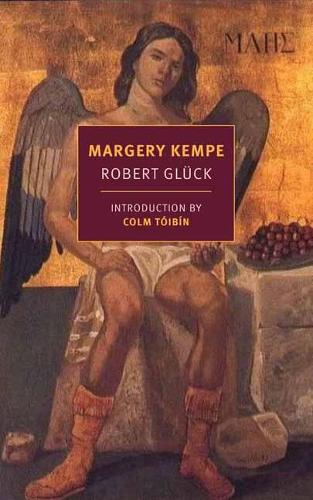
Margery Kempe
(Paperback)
Publishing Details
Margery Kempe
By (Author) Robert Glck
New York Review Books
NYRB Classics
10th March 2020
10th March 2020
United States
Classifications
General
Fiction
FIC
Physical Properties
Paperback
176
Width 127mm, Height 203mm
Description
Lust, religious zeal, and heartache come together in this provocative novel about two infatuations, one between a man and his young lover in the late 20th century and another between a 15th-century maiden and Jesus Christ. Margery Kempe is a tale of romantic obsession. It chronicles two relationships which take place in disparate worlds, separated by five centuries. The failed saint Margery Kempe lived in the fifteenth century, when she wrote what is believed to be the first autobiography. In Robert Gl ck's Margery Kempe, the author's love for a young man, L., frames the story of Kempe's mythical sexual desire and emotional passion for Jesus.
Reviews
"At once embracing and thwarting two worlds, two centuries, two sensibilities, what a subtle and powerful amalgam is Margery! Glucks exquisitely controlled, sensuously textured writing evokes a deeply integrated ecstatic vision that in the end spares us nothingbeing nuanced and brutal, passionate and colored with levity, elegant and outrageous." Lydia Davis
Glcks story about Margery . . . is like falling upward into a long dream about sex and Jesus, in Glcks hands a spectacle, visceral and sublime. . . . By the end,Margery Kempefelt to me like a mingling of Vita Sackville-Wests biography of Joan of Arc and the sort of pulp gay erotic fiction I found in porn stores in the 1980sthe illustrated covers feathery from years of being held, read, and put downand yet also somehow firmly within the tradition of any mural on any church or cathedral in Florence. Alexander Chee,Bookforum
"I, for one, find much to admire in contemporary gay authors. One of my favorites is Robert Glck." Edmund White
"Margery Kempeis a little-known late-twentieth-century classic, counterpoising sexual mores in the wake of the AIDS epidemic with the devastation of the European countryside at the end of the Hundred Years War. Glck is an acute and unsentimental observer of gestures, botany, skies, and cuisine. He captures the feeling and flow of the late Middle Ages, when 'mobility and chance were beginning,' and brings that world close to his own. Glck brilliantly locates the (New Narrative) impulse toward first-person narration in time and despair. He observes the turning of centuries. As he writes, 'Margery steps into modernity so empty she needs an autobiography.'" Chris Kraus,Bookforum
Glcks most beautiful work of fiction . . . The novel stands alone in Glcks oeuvre, not for its wildnesshis lucid, precise descriptions of sex distinguish each of his four volumes of fictionbut for its ambiguity. . . . The sense of sex as the summation of many minds and bodies, deeply personal in origin yet ultimately unmoored from the baggage of individual preference, makes moments in this often disturbing book gleam with the feeling of utopia. Daniel Felsenthal,The Baffler
"The writing is lovely. With the subtlety of the obvious, Glck collapses the centuries that separate the two storylines and zips up the space between erotic and religious devotion. Margerys orgasms are God-given, a mingling of godhead and maiden, an ecstasy of body and spirit. Arent most of us as mystified by our sexuality as we are by divinity Why not consider the former with the awe we reserve for the latter"Julia Berick,The Paris Review
"By the bold device of telling two stories in terms of each other (one of Margery Kempe and Jesus, and the other of a twentieth-century love affair), Robert Glck has produced a book without precedent. This novel brings to mind the huge wings of a painted angela texture of brilliant richness covered regularly with small, detailed shadows of implication." Thom Gunn
Margery Kempe[is] a touchstone of queer experimental writing. . . . The religious scaffolding is not simply an allegorical means of relating a love story, but a structure of feeling appropriate to the ravages of contemporary experience. Cam Scott,Berfrois
In some ways, the style of this novel resembles the terse, declarative expository prose that is taught as best practice in some MFA programs. Here, however, the accumulation of detail does not lend Glcks text a neutral perspective. Instead, every detail is fused with, and compromised by, the desire which spans over the entire observational field.Will Hall,Full Stop
Author Bio
Robert Gl ck is a poet, fiction writer, and editor. He founded the New Narrative movement in San Francisco with Bruce Boone and other writers. His poetry collections include Reader and La Fontaine, a collaboration with Boone. His fiction includes the short story collection Denny Smith and the novels Jack the Modernist and Margery Kempe. He has served as the director of San Francisco State's Poetry Center, co-directer of the Small Press Traffic Literary Center, and as editor for Lapis Press and Narrativity. He lives in San Francisco. Colm T ibin is Irene and Sidney B. Silverman Professor of the Humanities at Columbia. His latest book is Mad, Bad, Dangerous to Know- The Fathers of Wilde, Yeats and Joyce.
